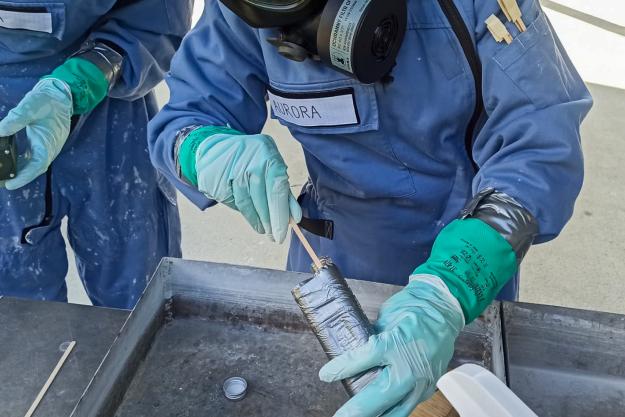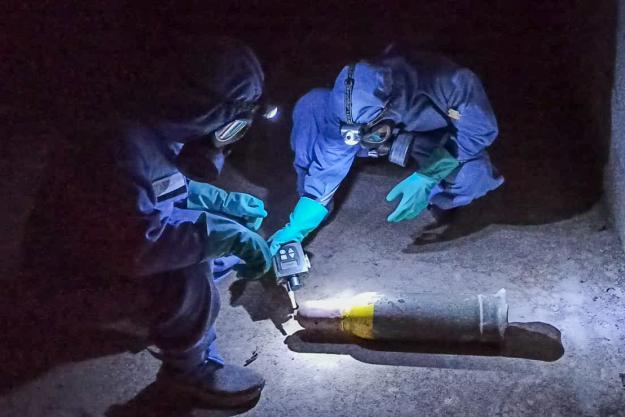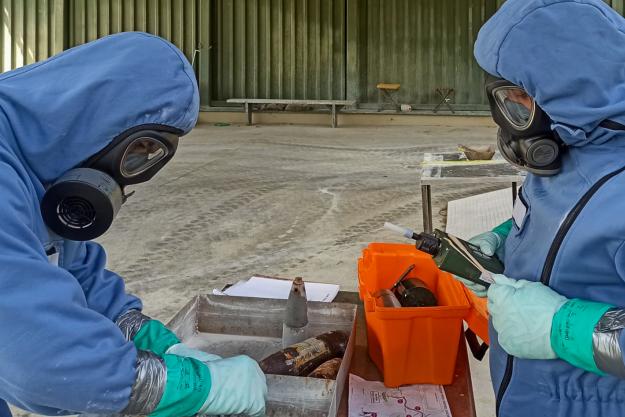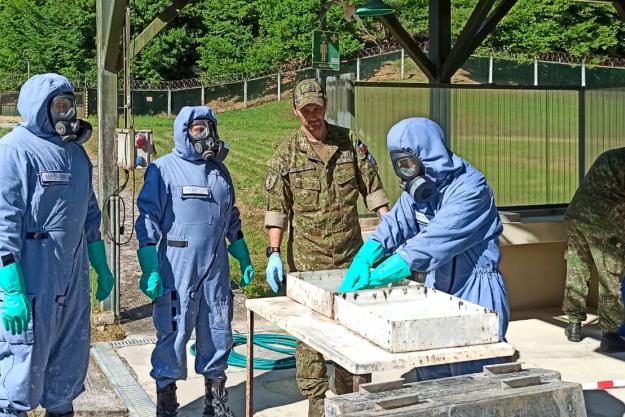
Participants search for potential toxic chemicals in a contaminated area during hands-on training.
At a secured facility deep in the Slovak countryside, the air is thick with anticipation. Wearing full protective suits, trainees methodically check every strap, every seal, every valve. Under the watchful eyes of seasoned instructors, they prepare to enter the “hot zone” – a high-security area where live chemical warfare agents are handled with utmost precision.
This is no simulation. This is one of the few places in the world where experts train with actual chemical warfare agents – deadly substances capable of causing harm or death upon exposure. The stakes are high, and the learning is real.
“In chemical emergencies, theoretical knowledge alone is not enough,” said Pavel Donoval, Director of Exercise of Live-Agent Training Course for Experts at the NBC Training and Testing Centre. “Training with live chemical agents conditions you to respond under pressure. It builds the muscle memory, judgment, and confidence that can mean the difference between life and death.”
This immersive training is part of the International Live Agent Training Course for Experts, organised by the Organisation for the Prohibition of Chemical Weapons (OPCW) in close partnership with the Government of Slovakia. Held annually at the NBC Training and Testing Centre, the programme is one of the few in the world that allows participants to work hands-on with real, highly toxic chemical warfare agents – all within a rigorously managed and secure setting.

Training participants perform detection activities in a dark environment, as a part of scenario-based exercise.
This year’s course, which ran from 16 to 26 June, brought together 18 carefully selected professionals from around the world. Over the ten-day programme, participants navigated a series of high-stakes drills: chemical detection, personal protective equipment procedures, secure sample collection, decontamination protocols, and full-scale emergency response simulations.
Each scenario is designed not only to build technical skills, but also to prepare participants psychologically for real-world incidents – where quick decisions, steady nerves, and flawless execution can mean the difference between life and death.
Real agents, real impact
“This course gave me the real picture of how to respond in a chemical emergency,” said Francisca Simiyu, Port Security Officer and Head of the CBRN security response unit at the Kenya Ports Authority. “The use of live agents, especially during tunnel-based detection drills, helped me visualise how to approach real incidents and apply protective measures effectively.”
Major Tabri, Engineer Officer in the Indonesian Army, agreed: “I will immediately integrate these skills into our operational protocols. This training will not only enhance my team’s performance in handling live agents, but also strengthen our collaboration with national and international partners.”
Why are trainings with live chemical warfare agents important?
Live chemical warfare agents are among the most dangerous substances on Earth. They are considered “live” because they are active and capable of causing harm or death upon exposure. Used in warfare or terrorism, they are banned under the Chemical Weapons Convention (CWC) except for strictly controlled research and protective purposes.

Participants learn chemical detection techniques during a hands-on exercise in a contaminated area.
Trainings with live chemical warfare agents are conducted at only few specialised facilities worldwide under strict safety and international regulatory protocols, making them a rare but essential component of chemical emergency preparedness for military, first responders, and counter-terrorism professionals. Unlike simulated exercises, live-agent trainings provide authentic conditions that replicate the sensory, operational, and psychological challenges of a real chemical threat environment. These trainings are critical for building the confidence, precision, and decision-making skills required in high-stakes situations.
Comprehensive medical support is available throughout the training, including an on-site military doctor, mobile ambulance, and fully equipped medical personnel. Participants wear full personal protective equipment, including Saratoga suits, overboots, and triple-layered gloves. Each is also equipped with autoinjectors and reactive skin decontamination lotion (RSDL) to ensure immediate response in case of exposure
OPCW and NBC Training and Testing Centre: a long-standing partnership
The NBC Training and Testing Centre, operated by the Slovak Ministry of Defence, is one of the few facilities globally authorised to conduct live agent exercises. It combines cutting-edge infrastructure with high safety standards, offering participants the chance to learn and test their skills in environments that accurately simulate real-life chemical incidents.

Participants decontaminate after potential exposure to toxic chemicals during a high-risk mock exercise in the hot zone.
The NBC Training and Testing Centre is widely recognised as a centre of excellence, hosting annual training for many of Slovakia’s international partners. Since 1997, the Slovak Republic has conducted OPCW training activities at least three times per year, including specialised live agent exercises. The OPCW is one of its most prominent and long-standing partners. This well-established collaboration supports trainings of OPCW inspectors as well as first responders from Member States, strengthening global preparedness to prevent and respond to chemical weapons use.
“As a committed Member State of the OPCW, the Slovak Republic takes seriously its obligations under Articles VII and X of the Convention,” said Mr Filip Varga, Senior Counsellor at the National Authority of Slovakia. “Our long-standing partnership with the OPCW plays a vital role in strengthening international readiness and resilience against the potential re-emergence of chemical weapons. By hosting live agent trainings and contributing to global capacity-building activities, we are proud to support a safer, more secure world—and we look forward to continuing this close cooperation in the years ahead.”
